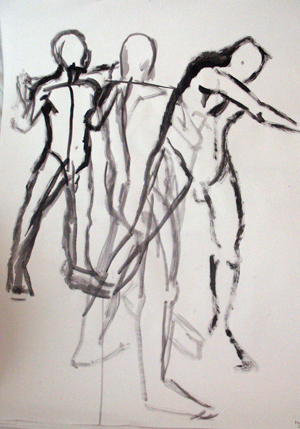starstrewnsky
Five star rated songs
![]() These are songs that are currently rated 5 stars on my MP3 player:
These are songs that are currently rated 5 stars on my MP3 player:
If you have Spotify (download it, it's free and a very useful way of listening to music) you can listen to a playlist of these and other songs I like
You make loving fun, Fleetwood Mac
Why?
The album, Rumours, is a heartbroken classic and it should be in your collection.
This song from it is a really upbeat paeon to a lover. It has some of my favourite guitar playing, ever; subtle and restrained, but brilliant. When the chorus comes round it is awash with harmonies.
Absolute joy.
Likely 5 star longevity: My lifetime.
Sawdust and diamonds, Joanna Newsom
Why?
It is mesmerising, magical, and poetic. It has the power to conjure you away to some other world, as if pulling you through a mirror, or into some fine tapestry or oil painting. I have never heard anything quite like it, the harp has the quality of a glistering, shimmering, gaily tripping stream, and her voice and words are so beautiful, evocative and fragile.
'I wanted to say: why the long face?
Sparrow, perch and play songs of long face
Burro, buck and bray songs of long face!
Sing: i will swallow your sadness and eat your cold clay
Just to lift your long face
And though it may be madness, I will take to the grave
Your precious longface
And though our bones they may break, and our souls separate
- why the long face?
And though our bodies recoil from the grip of the soil
- why the long face?'
Likely five star longevity, a sparrow's lifetime.
Sweetness, Lloyd Cole and the commotions
Why?
The song drifts in with a pipe organ, then this perfect guitar picking over the top of it. Then Lloyd sings 'oh you're a precious little pearl - but tell me true have you ever had a care in the world?'.
I have loved this song since I was 14 and it has lost none of its beauty or merit in all those years. I think the guitar riff is a work of simple perfection, the lyrics are brilliant and poetic, the melody gorgeous and sweeping and it has a beautiful use of feedback for its solo.
Almost a perfect song, I would say.
Likely 5 star longevity: My lifetime.
Baby, we'll be fine, the National
Why?
This song drives out with stilted percussive drums, mesmerising guitar parts and louche but earnest, almost mumbled, delivery.
There is something poetic about the mundanity of the lyrics 'all night I lay on my pillow and prayed, for my boss to stop me in the hallway' and it has a sort of mesmeric urgency that is intertwined with delicacy and awkwardness.
'all we've got to do is be brave, and be kind'
See the National's website
Here is a blog link to an MP3 of the song, but buy the album Alligator - you will not regret it
Likely 5 star longevity: 23 years. It's been a 5 star favourite for three years already.
Oliver James, Fleet Foxes
Why?
I saw these people at the Hoxton Square bar and kitchen, I didn't know who they were but they looked like amiable hippies and were very genial on stage.
When the lead singer played this solo, there was an awed silence in the crowd, we were all blown away by it. And when he finished there was a moment of respectful hesitation and everyone applauded wildly, he look genuinely humbled and taken aback by the reaction.
This song is about a drowning, which is far from cheery, but the song is sweet and stirring.
Here is a blog link with some live recordings, including this song
Likely 5 star longevity: 2 months.
Tubism
BUY A PRINT OF THIS WORK
In order to paint it I took a trumpet and held it in one hand, rather like Hamlet with Yorick's skull and I also listened to a range of trumpet jazz, starting with Charlie Parker and running the whole gamut - Chet Baker, Miles Davis, and so forth.
Stylised nude
Male nude
Something very strange...
In this age of global satellites and google Earth under the sea, it can seem that there is little left unknown in the world.
And that is where Bloop comes in.
From Wikipedia: 'Bloop is an ultra-low frequency underwater sound detected by the U.S. National Oceanic and Atmospheric Administration several times during the summer of 1997. The source of the sound remains unknown.'
Basically, the form of the sound is consistent with that of a living animal, but it would have to be much larger than the largest animal known (also the largest animal ever known to have existed on Earth), the Blue Whale, in order to generate such a sound.
You can listen to the sound here at Bloopwatch.org (2.5 MB version)
The conscious mind
Large hadron collider
On September the 10 2008, the switch was thrown and the great machine whirred into life, on October 21 the first high energy collision is scheduled - protons will dash around a circuit, to collide at a speed a fraction below the speed of light. And the collision will cause the particles to resemble the state of matter a billionth of a second after the birth of the universe. 
Some people believe that this will cause the end of the world. Just as some people have always believed many things have heralded the end of the world. Eclipses, arbitrary calendar dates, asteroids and giant space crabs (probably). When faced with the new, or unknown, people have made all sorts of predictions, Dr Dionysius Larder said in the 19th century 'rail travel at high speed is not possible because passengers, unable to breathe, would die of asphyxia', for instance. Here is a list of other erroneous predictions.
Of course, the untested nature of this experiment means there is a wild card chance that the naysayers will be proved correct.
Professor Otto Rössler is one notable doomsayer among a handful of worried scientists mounting a last minute challenge to the experiment. He believes that particles colliding at such speeds will create miniature black holes that will slowly munch away at the fabric of the universe.
This site: http://www.lhcfacts.org / is entirely devoted to the pessimism of the doomsayers. but this is the official site of the large hadron collider: http://www.lhc.ac.uk/ where an enthusiastic optimism reigns. They hope to understand why particles that make up matter have mass, while the particles that make up light don't appear to have any mass at all. The elusive Higgs boson is a theoretical particle that has been postulated to make sense of this. Perhaps it will show up, at long last, when the collider smashes it into being.
When it comes down to it, we are being bombarded continually by cosmic radiation - particles are shooting through you as you read this - including neutrinos and radioactive cosmic rays. The universe is far stranger that any experiment we can perform. The LHC is a grand monument to human endeavour, raise a toast to human inquisitivity - it might be your last!
Triage
Choices
I recently saw this excellent and thought provoking film. Dr James Orbinski relates his experience in the midst of diabolical human conflicts, attempting to save lives through his work as a Doctor with, and President of the international council of, Médecins Sans Frontières.
Paradox 2 - the set that cannot contain itself
 The set of all sets that do not contain themselves as members cannot contain itself, therefore it both does and doesn't contain itself.
The set of all sets that do not contain themselves as members cannot contain itself, therefore it both does and doesn't contain itself.
Or to put it more simply:
A popularised version of Bertrand Russell's paradox is to imagine a place where there is a male Barber. He shaves all the men who do not shave themselves.
Does he shave himself?
He cannot, because he can only shave those who do not shave themselves. If he does not, then he does not shave himself and therefore is part of the set of those who do not shave themselves, and he must shave himself...
Wittgenstein claimed to have solved this paradox (Russell's theory of types) in his 'Tractatus'. Essentially he claimed it showed a problem with using language to describe the world and used logical symbols to refute it. You can read more on this here, at project Euclid
Paradox 1 - Buddhism, desiring to end desire
 Siddharta Gautama, the Buddha, taught that all existence is suffering, and that all suffering is predominantly caused by want - or desire. In order to be free of suffering, we must rid ourselves of wanting.
Siddharta Gautama, the Buddha, taught that all existence is suffering, and that all suffering is predominantly caused by want - or desire. In order to be free of suffering, we must rid ourselves of wanting.
The precepts seem quite sensible, but there is a paradox here.
We are told that we must end suffering by ending wanting.
But wanting to end suffering is in itself a further want.
So, by wanting to decrease our suffering we are actually increasing it.
John Visvader refers to this as an uroboric (like a snake swallowing its own tail) philosophy.




